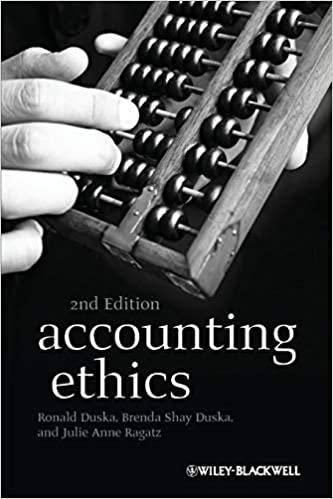Question
Managerial Accounting Project 6 Capital Budgeting Provident Co is a mid-sized financial services firm with small offices throughout the United States. Management is considering the
Managerial Accounting
Project 6 Capital Budgeting
Provident Co is a mid-sized financial services firm with small offices throughout the United States. Management is considering the best way to invest cash that has been set aside for technology improvements. They have narrowed their decision down to two options.
Option #1 Moving to the Cloud
Provident would move their servers to a Cloud based system. The savings would be immediate as they can sell their old server equipment for $300,000, after applicable taxes. To move to the Cloud based system, Provident would need to modify their current equipment and pay a onetime set up fee for a total acquisition cost of $700,000. They would also need to train their employees to use the new system and the estimate for training costs is $50,000 to be spent in the Year 1. Under this plan, Provident would save $260,000 a year on expenses related to maintaining their own servers, and they would pay their Cloud vendor $100,000 per year in fees. Provident will set aside $200,000 in working capital for this project and this capital will be recovered at the end of 5 years. There is no salvage value for the new equipment, but Provident will be able to recycle the equipment for free.
Option #2 Big Data Investment
Provident would invest in software and some hardware upgrades that will allow them to better analyze the traffic coming in to their website. Total acquisition costs for this option are estimated to be $400,000. This improved analytics capability is expected to lead to increased revenue of: $80,000 in Year 1, $120,000 in Year 2, $250,000 in Year 3, $350,000 in Year 4, and $500,000 in Year 5. The estimated cost of this obtaining this revenue will be 20% per revenue dollar related to sales staff that will analyze this data and use it to generate new client relationships. Provident will also incur fixed costs of $10,000 per year related to software updates and hardware maintenance. Provident will set aside $250,000 in working capital for this project and this capital will be recovered at the end of 5 years. The salvage value of the new equipment will be $9,000 at the end of 5 years.
Additional Information:
- Each option has a five year useful life.
- Provident uses a 10% discount rate to evaluate all of their projects.
- Acquisition costs for both projects qualify for modified accelerated depreciation (MACRS) of 50, 30, and 20% in the first three years of the project.
- Provident is a profitable company and any income or cost savings would be taxed at Providents tax rate of 30%.
- All dollar values referenced in this case are in nominal dollars. For your analysis, ignore the effect of inflation.
Assignment
1. Given the data provided, calculate the Payback Period, Internal Rate of Return, NPV and Profitability Index for one of the two options.
2. Option #1: Due to increased demand for Cloud computing resources, Providents Cloud computing fees are expected to rise 10% from Year 1 to Year 2, 6% from Year 2 to Year 3, and level off (stay the same) in Years 3-5. This increase in cost would not have happened if Provident stayed with their old system of housing their own servers.
Option #2: The data analytics program pays off a lot faster than expected. Revenue is projected to be $200,000 in Year 1, $250,000 in Year 2, $250,000 in Year 3, $300,000 in Year 4, and $300,000 in Year 5.
3. Option #1: Expecting a difficult year, Providents Cloud vendor decides to waive their annual fee in Year 1, but will charge Provident $125,000 per year in Years 2-5.
Option #2: The data analytics program pays off slower than expected. Revenue is projected to be $20,000 in Year 1, $80,000 in Year 2, $200,000 in Year 3, $500,000 in Year 4, and $500,000 in Year 5.
4. Congress is proposing a new corporate tax plan that reduces the federal tax rate that Provident pays from 30% to 15%. However, this tax plan would also do away with MACRS and replace it with straight line depreciation for tax purposes (over five years for both options).
A.) Using the original estimates for your designated option, estimate the effect of this tax plan on NPV.
B.) Next, given the uncertainty related to the effect of the proposed tax plan on future business, use a 15% hurdle rate instead of the 10% hurdle rate used before in estimating the effect of the tax plan (i.e. just redo 4A).
Step by Step Solution
There are 3 Steps involved in it
Step: 1

Get Instant Access to Expert-Tailored Solutions
See step-by-step solutions with expert insights and AI powered tools for academic success
Step: 2

Step: 3

Ace Your Homework with AI
Get the answers you need in no time with our AI-driven, step-by-step assistance
Get Started


